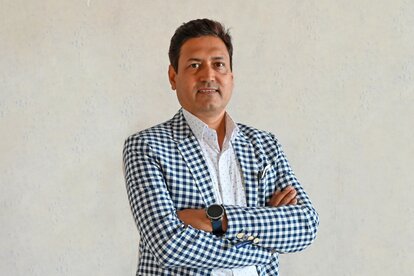One of us (the one without a WASH - Water, Sanitation and Hygiene background!) has never forgotten a biology experiment in secondary school. All 30 of us smeared our hands onto a petri dish of agar jelly, washed them with soap and water, and then smeared them onto another petri dish. We incubated the dishes, and after some time, checked for bacterial growth. Of course, the experiment was meant to demonstrate how washing hands reduces bacteria on our hands. We found the opposite; there were more bacteria on the petri dishes after washing our hands! We realized that we had failed to wash the tap after touching it with our dirty hands and had all used the same rather dirty towel. The experiment showed us just how easily bacteria spread; viruses can spread just as readily.
Handwashing is suddenly becoming a habit
In Nepal, the Helvetas WASH team has been working on hygiene messages, especially the importance of handwashing, for many years. Behavior change is often difficult to achieve and takes years, but we have seen how within just a few months, the Covid-19 crisis has impacted behavior. Handwashing has become regular practice even in rural areas that only recently established household handwashing places. Once behavior becomes a habit, people continue with it even after the original trigger has passed.
Yet if many people are using the same hand-washing station, there remains the issue of cross-contamination – especially from touching the tap and the soap container. There is therefore a risk of spreading the Covid-19 virus even when “doing the right thing”.
A challenge for technicians; an elegantly simple result
This concern spurred the WASH team to develop a simple, foot-operated hand-washing station that can be manufactured in local workshops. The user presses the right pedal, and water flows through the tap; s/he then presses the left pedal, and liquid soap squirts out. Building and then testing the structure in a small workshop in Birendranagar (the provincial capital of Karnali, province 6), it took the team a little while to perfect the pedal mechanism. Various protypes were tested before arriving at the final model, which operates smoothly and effectively. The picture here shows an early model that was rejected

The World Health Organization (WHO) recommends that handwashing with soap and water should last 20-30 seconds. This requires a significant quantity of water; if a tap is opened for 20-30 seconds, about 2-3 liter will be needed just to wash one pair of hands. Clearly it is better to reduce the amount of water by using it to just wet the hands, and then to wash off the soap. This can be done easily operating a pedal. To ensure adequate water supply, the hand-washing station has an iron frame supporting a 500-liter HDPE (plastic) tank.
A positive response from officials
The first pedal-operated handwashing station in the province was inaugurated by Mohan Maya Dhakal, Deputy Mayor of Birendranagar municipality on 12 May. She spoke as follows,
Mohan Maya Dhakal, Deputy Mayor, Birendranagar Municipality inaugurated the first pedal-operated hand washing at her office
The following day (13 May), another handwashing station was delivered to a ward office of Birendranagar municipality. Inaugurating it, Dhurba Kumar Chapai, ward chairperson, noted that if provided with the design, he would use the ward’s own funds to make another such station for the ward health post. Manju Bhandari, Admin Assistant of ward 8, Birendranagar municipality, commented,
“Normally, we celebrate handwashing day once a year on 15 October. However, we have been celebrating handwashing every day due to the new challenge of COVID -19.”
Support for Lekhbesi municipality
Handwashing stations are currently being delivered to other municipalities in Karnali – amongst them, Lekhbesi municipality, where Helvetas’ local NGO partner SAC Nepal facilitated delivery. The photo heading this blog shows Gagan Singh Sunar, Mayor of Lekhbesi, trying out the first hand-washing station that was installed, outside the municipal office. All our WASH work in Lekhbesi, including this specific Covid-19 response, is funded by charity: water. This has allowed the installation of seven pedal-operated operated handwashing stations at important public offices such as the municipal office and health posts. The municipality also received 25 sets of personnel protective materials for frontline health workers, and supplies of sanitizer, gloves, surgical masks and N95 masks. In addition, the 565 households benefitting from the water schemes currently under construction each received a handwashing bucket with a tap, five bars of soap, and four reusable masks.
Following the installation of the pedal-operated handwashing station at Satakhani health post in Lekhbesi municipality, Public Health Supervisor Chaturbhuj Gautam commented as follows
Handover of the handwashing station to the Public Health Supervisor, Satakhani Health Post, Lekhbesi
Rolling out pedal-operated handwashing stations
The workshop in Birendranagar is busy producing more pedal-operated handwashing stations. In collaboration with charity: water, Helvetas currently plans to install about 50 such stations at public places in seven other municipalities of Karnali province. The municipality of Kamalbazar in Achham (province 7) will be similarly supported through collaboration with the Solaqua Foundation.

We would especially like to acknowledge the hard work during the lockdown period of Helvetas team members Ram Shrestha, Nilkantha Pandey, Prem Shrestha, Tek Khasu, Ramesh Chaudhary, Prakash Ayer and Ramu Chaudhary - and of Tika Ram Achary, Netra Thapa and Padam Shahi of SAC Nepal.





